This post may contain affiliate links. Please read our disclosure policy.
Chiang Mai noodles, or khao soi noodle soup, is a northern Thai dish that tastes like heaven! This chicken khao soi is simmered in a creamy coconut milk broth and is super tender, beautifully spiced, aromatic, and full of flavor.
Follow my simplified steps and easy shortcuts to make authentic Chiang Mai curry noodles that are bursting with layers of flavor, without any hassle. This easy khao soi soup recipe uses accessible ingredients with options to add authentic Thai garnishes.
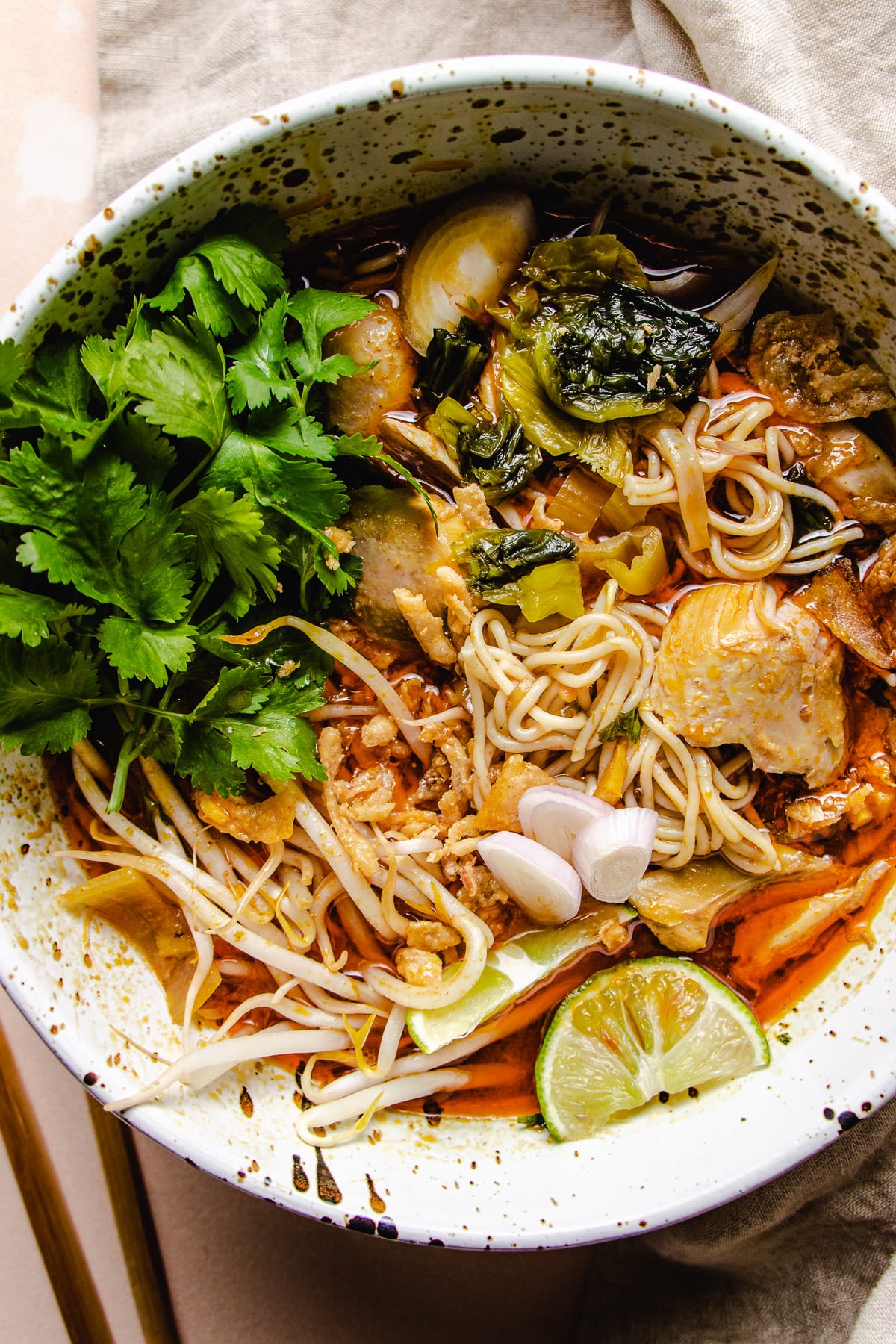
Table of Contents
What is Chiang Mai khao soi?
Khao soi (also known as Kao Soy, kaosoy, Kao Soi, Khao Soy, Kow Soi) is a soupy Thai curry noodle recipe famous in northern Thailand’s Chiang Mai region. It’s also known as Chiang Mai noodles or Northern noodles.
Khao means rice, Soi means julienned or cut, and Gai (or kai) means Chicken.
Curry Chiang Mai soup comes with a rich and mildly spicy coconut milk broth, slowly simmered with dark meat chicken (often chicken drumsticks). Beef, pork, and shrimp are also popular protein choices for Chang Mai noodles.
Traditional Kao soy ramen is served with Chinese egg noodles and the noodles are used in two ways in the noodle soup – boiled and crispy fried as a topping. This Chiang Mai noodle dish is creamy, rich, and super flavorful that’s perfect for colder months.
Ingredients
This easy khao soi recipe uses accessible ingredients and simplified cooking steps to achieve the rich, authentic flavors that Chiang Mai chicken curry noodles are known for. The ingredients form 4 main components: the curry paste flavor base, the stewed chicken, the noodles, and the toppings.
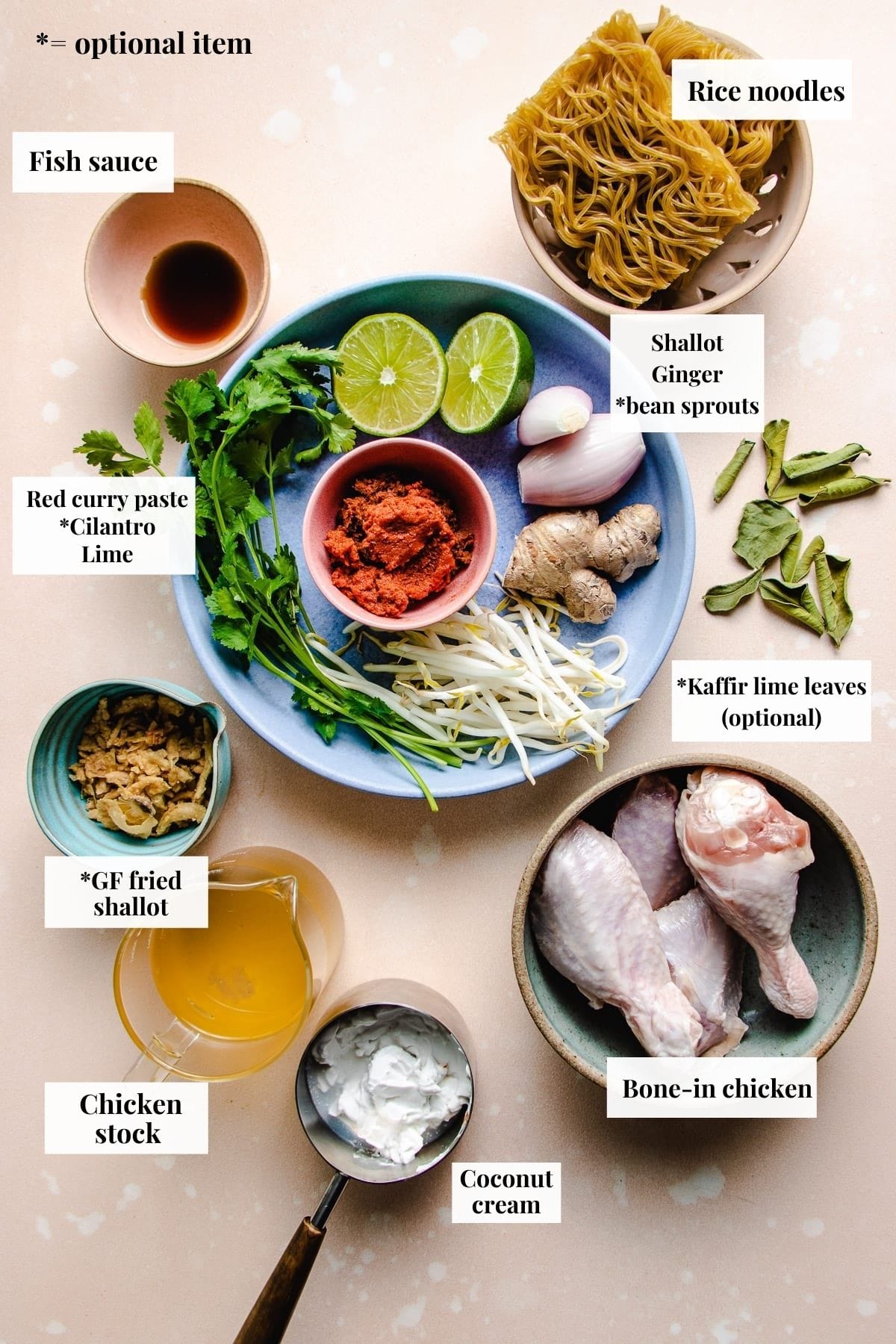
Save This Recipe
Thai Khao Soi Flavor Base:
- Khao soi paste: Chiang Mai khao soi uses a mild curry paste for its flavor base. Thai Kitchen red curry paste has a balanced flavor—not too spicy—and is easy to find at the grocery store.
- Avocado oil: This neutral-flavored oil is used to sauté the aromatics.
- Shallot and ginger: These aromatics are sauteed to create a flavor base. If you can find it, you can use galangal root (Thai ginger) in place of ginger for authentic flavor.
- Spices: We add a mix of ground coriander, turmeric, cumin, and garam masala powder when sauteeing the curry paste and aromatics to build up the flavor foundation.
- Full fat coconut cream: This lends a subtly sweet coconut flavor to the base and creates a creamy texture.
Chicken noodle soup components:
- Chicken: Use chicken drumsticks or chicken thighs with the skin on and bone in to elevate the flavor. I don’t recommend using chicken breast—it won’t taste the same!
- Water or chicken stock: We will use this to simmer the chicken and create a broth for these Thai soupy noodles.
- Fish sauce: To taste. This gives the dish an authentic Thai flavor.
- Coconut sugar: To taste. Add this after the soup has simmered to balance the saltiness from the fish sauce.
- Kaffir lime leaves: Use either fresh or dry. If using fresh, squeeze the leaves in your palm to release the fragrance before adding them to the broth. This adds a fresh lemony-citrus flavor.
- Thailand Soup Noodles: A mix of crispy fried egg noodles and boiled egg noodles is traditionally used in khao soi gai. I use Thai rice noodles to keep it easy and gluten-free.
Toppings:
- Lime juice: Adds tanginess and a pop of freshness to the soup.
- Cilantro: Chopped and sprinkled on the soup.
- Fried shallot: Or store-bought fried onions for crispiness and added flavor.
- Chinese pickled mustard greens: Diced. Gives a salty flavor and adds crunch.
- Bean sprouts
Substitutions and variations
- Different proteins: Beef khao soi is most common after chicken, but pork is also popular. Use parts that come with bone for more flavor, like in this brisket pho.
- Noodles: Chinese egg noodles (not gluten-free), ramen noodles, or pho rice noodles will work. Read about more types of Chinese noodles.
- Oil: Coconut oil or peanut oil can also be used for sautéeing.
- No kaffir lime leaves? You can substitute lime and lemon zest for kaffir lime leaves. Use zest one whole lime and the zest of half a lemon.
- Khao soi paste: Make homemade paste from Hot Thai Kitchen with fresh garlic cloves, shrimp paste, and lemongrass in a mortar and pestle. Or use store bought paste or curry powder.
- Fish sauce alternatives: Light soy sauce, coconut aminos, or vegetarian fish sauce.
- Spicy: Garnish with a few slices of Thai chili pepper or drizzle with Thai chili sauce nam jim jaew.
- Toppings: Add boiled eggs for an extra dose of protein and green onions or fresh herbs like Thai basil for a pop of freshness.
What are the must-have ingredients for Chiang Mai khao soi?
Out of all the ingredients, the must-haves are Thai red curry paste, ginger, shallot, coriander powder, turmeric powder, and cumin powder for the flavor base. Bone-in chicken, stock or water, coconut sugar, fish sauce, and noodles for the soup. And lime juice for a garnish.
How to make khao soi
Khao soi Chiang Mai curry is rich and creamy, with layers of flavor that you may think are difficult to obtain. But this Chiang Mai noodle soup, like most Thai food, comes together quickly. The secret is building a strong flavor foundation and achieving a balance of salty, sweet, umami, and tanginess.
- Saute aromatics: In a large pot, wok, or Dutch oven, stir-fry the curry paste, shallot, ginger, and dry spice seasonings in oil over medium-low heat for 1 minute.
- Add the cream: Add the coconut cream and keep sauteing until you can see the oil starts surfacing to the top and is separated from the paste, about 3 minutes or longer.
- Simmer the chicken: Add the chicken, remaining coconut cream, water, fish sauce, sugar, and lime leaves. Cover and simmer over medium-high heat for 5 minutes. Then, lower the heat to simmer and cook for 30 minutes.
- Cook the noodles in a separate pot, following the package instructions.
- Adjust the flavors: Once the chicken has fallen off the bone, taste and adjust the taste with fish sauce, sugar, and lime juice as needed. Khao soi taste should be savory, sweet, a little spicy, with a hint of zesty sour.
- Garnish and serve: Add cooked noodles to separate bowls with chicken and a few spoonfuls of hot broth. Garnish with fried shallots, pickled Chinese mustard greens, sliced shallots, and bean sprouts, if using. Serve with extra lime wedges on the side. Serve hot.
TIP: I do not recommend making Chaing Mai noodles in an Instant Pot as the coconut milk might curdle. Simmer the soup over low heat to allow the flavor to develop and the texture to thicken naturally. Avoid letting the soup come to a boil in a short amount of time under high pressure.
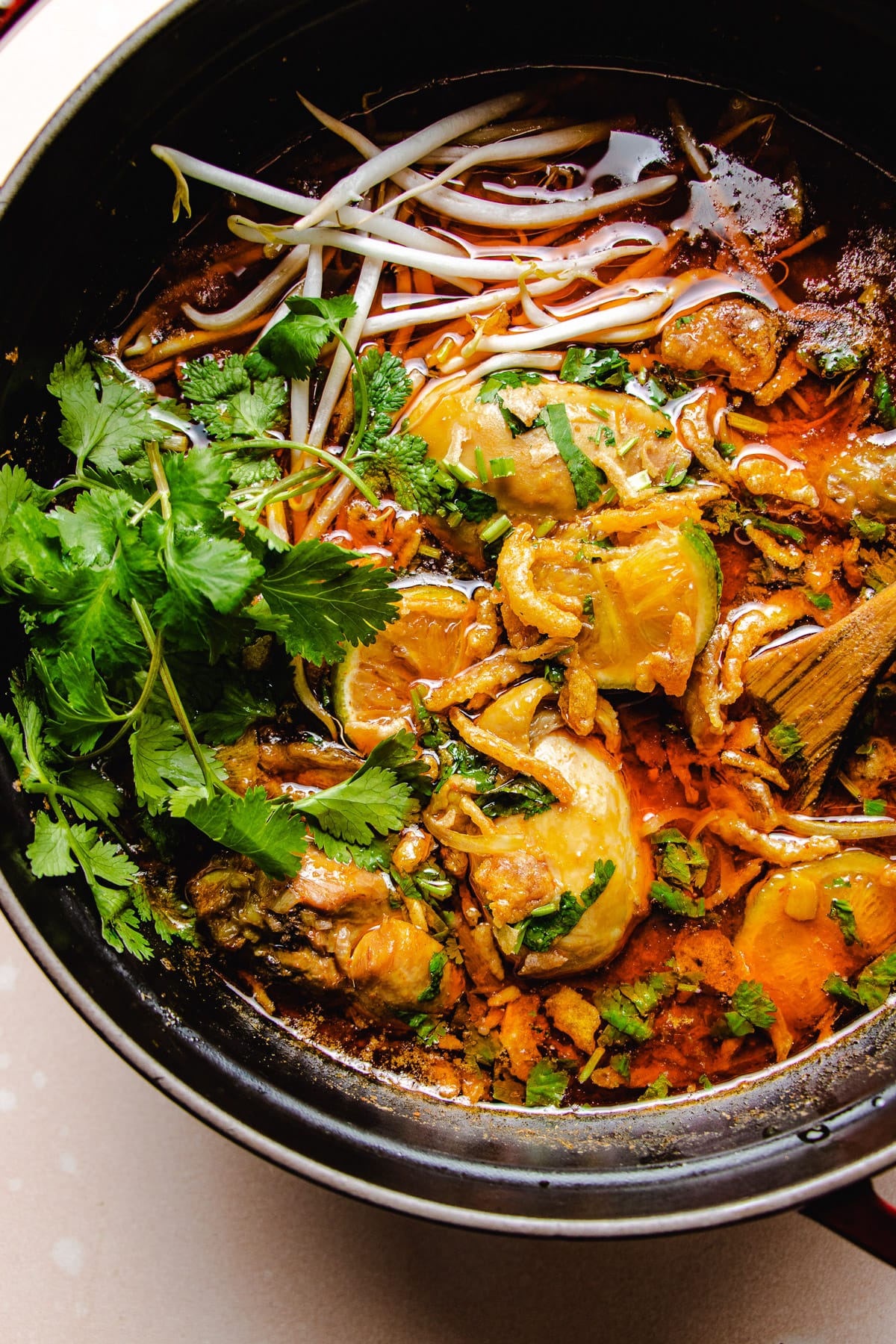
How to make ahead, store, and reheat
I love this Northern Thai soup so much that I tend to make large batches so I can eat it throughout the week. Here are instructions for preparing the soup ahead of time, storing, and reheating:
- Make ahead: Make the broth with chicken a few days in advance. Boil the noodles right before serving. Can also prepare the condiments in advance.
- Storage: Store the noodles separately from the curry soup in an airtight container in the fridge for 4 days.
- Reheat: Reheat on a stovetop over medium heat. The broth will gelatinize. Add more water to thin the broth if it becomes too thick then taste and adjust.
What to serve with Chiang Mai Thai noodle soup
This kow soi thai recipe is a nourishing meal on its own—but for a true “family style” Thai feast, I love to pair it with wontons, veggie sides, and extra protein dishes. Here are some of my favorites:
- Wontons: Top with these crispy air fryer wonton chips or add boiled shrimp wontons to the soup.
- Protein dishes: Thai beef salad (Nam Tok Neua) is a traditional meat salad with loads of spicy flavor. Or try this Thai chicken wings air fryer recipe for a quick and delicious protein option!
- Veggie sides: Use up any extra greens in this hearty and nutritious Chinese mustard greens stir fry recipe, or try this delightful Thai mushroom salad with fresh herbs!
Expert tips
- Essential Ingredients for Authentic Flavor: For a delicious Kao Soi without all the extras, make sure you have Thai red curry paste, ginger, shallot, coriander powder, turmeric powder, cumin powder, chicken, stock or water, coconut sugar, fish sauce, noodles, and lime juice. These are the core ingredients that capture the essence of the dish.
- Gentle Cooking is Key: Avoid bringing the soup to a rapid boil to prevent the coconut milk from curdling. While it doesn’t affect the taste, it can result in white flaky bits in the broth.
- Choose Bone-In Chicken: Use bone-in chicken drumsticks or thighs for the best flavor. These cuts contribute to a richer, more flavorful broth.
- Time Management: Set aside about 45-50 minutes for the entire cooking process. The actual active cooking time is relatively short, around 15 minutes, thanks to the simplified recipe. However, the chicken will need about 30-35 minutes to simmer until it’s tender.
- Seasoning Balance: Finish with fish sauce, sugar, and lime juice, adjusting to taste.
- Cook Noodles Separately: Cook noodles separately to maintain broth consistency.
- Noodle Varieties: Traditional khao soi uses Chinese egg noodles (fried and boiled). Experiment with different types of noodles, including gluten-free options.
FAQs
Khao Soi noodles, made from wheat flour and eggs, are served two ways: deep-fried for a crispy topping and boiled in the soup, offering a delightful contrast of textures in the curry noodle dish.
Use chopsticks for the noodles and a soup spoon for the broth. Debone the chicken first for easy serving. Lightly break up the crispy fried noodles, stir them into the soup broth for a mix of textures, and enjoy with garnishes like lime, crispy shallots, and pickled mustard greens.
Khao Soi is a Thai dish, influenced by Burmese cuisine. It’s a unique blend of Thai and Burmese flavors, popular in Northern Thailand, particularly in Chiang Mai.
Chinese wonton egg noodles are used in Khao soi gai. These wonton noodles are yellow and are served used two ways – fried (as a crispy topping) and boiled (to add to the curry noodle soup).
Laksa and Khao Soi are Southeast Asian noodle soups, but they differ in flavors and ingredients. Laksa, commonly found in Malaysia and Singapore, is usually spicier and includes a variety of seafood or chicken. Its broth can range from spicy and creamy to slightly sour, often flavored with tamarind.
Khao Soi is a coconut curry noodle soup originating from Northern Thailand that features a milder, creamier curry broth, typically made with chicken and distinguished by spices like fresh turmeric, cardamom pods, and curry.
More Thai recipes you might like
If you’re a lover of Thai cuisine be sure to give these classic dishes a try! Save money on takeout with these easy and healthy Thai food recipes.
- Thai larb: Authentic and super flavorful minced meat salad with fresh herbs and vegetables.
- Pad woon sen: Sweet and savory saucy stir-fried glass noodles (or low carb kelp noodles) with vegetables.
- Thai basil chicken: A quintessential sweet and savory Thai food dish!
- Thai red curry chicken: A bold and creamy Thai curry dish with medium spice.
- Thai green curry chicken: A super creamy and delicious slow cooker recipe.
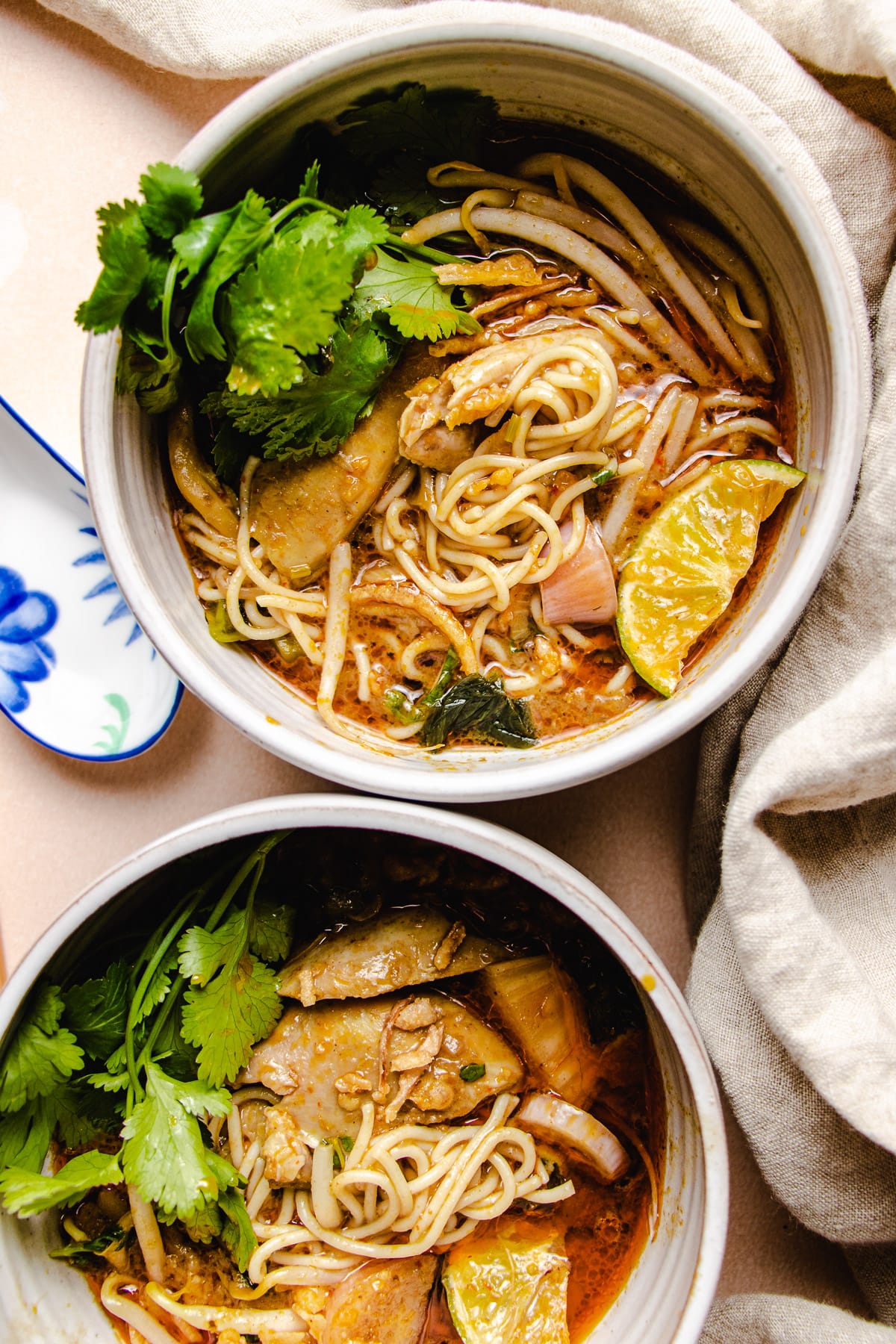
Chiang Mai noodles recipe
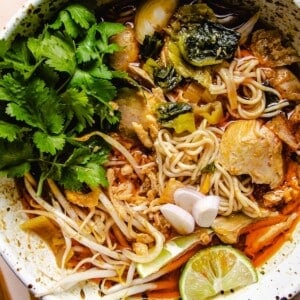
Video
Ingredients
- 3-4 tbsp Thai Kitchen red curry paste
- 4 tbsp avocado oil
- 4 oz. shallot finely chopped, 2 large
- 0.5 oz ginger finely chopped
- 1 tsp EACH coriander, turmeric, cumin, and garam masala powder
- 14 oz. Full fat coconut cream
- 2 lbs chicken drumsticks or thighs (skin-on and bone-in)
- 2.5-3 cups water or chicken stock
- 1-2 tsp fish sauce or to taste
- 2 tbsp coconut sugar or to taste
- 4 pieces kaffir lime leaves fresh or dry, optional
- Rice noodles or Chinese wonton noodles
Toppings of choice:
- 1 whole lime juice plus extra for serving
- Coriander leaves chopped, optional
- Fried shallot or fried onion, store-bought, optional
- Chinese pickled mustard greens diced, optional
- Bean sprouts optional
Instructions
- Preheat a Dutch oven or 4-quart (or larger) heavy soup pot over medium-low heat until it feels warm. Add the curry paste, oil, shallot, ginger, and dry spice seasonings – coriander, turmeric, cumin, and garam masala powder. Saute over medium-low heat for 1 minute.
- Add ½ cup coconut cream and keep sauteing over medium-low heat until you can see the oil starts surfacing to the top and is separated from the paste, about 3 minutes or longer. Stir often with a wooden spoon so that the paste won’t get burnt.
- Add the chicken and gently stir to coat the curry paste over the drumsticks. Add the remaining coconut cream, water, fish sauce, sugar, and lime leaves, if using. Give it a stir then cover the pot and bring it to a gentle boil over medium heat, about 5 minutes. Then, lower the heat to simmer and cook for 30 minutes.
- In the meantime, cook the noodles in a separate pot, following the package instructions.
- Once the chicken has fallen off the bone tender, taste and start seasoning the broth further with fish sauce, sugar, and lime juice to taste. The flavor should be savory, sweet, a little spicy, and zesty sour flavor.
- To serve, you can shred the chicken or serve a whole drumstick as people do in Thailand. Add the boiled noodles to individual serving bowls with chicken and a few spoonfuls of hot broth. Garnish with fried shallots, pickled chinese mustard greens, sliced shallots, and bean sprouts, if using. Serve with extra lime wedges on the side. Serve hot.
Notes
- For a thinner broth, add more water or stock.
- For slow cooker: Set it on high for 4 hours or low for 6-7 hours.
- Can I use boneless chicken? I don’t recommend it. You can use a combination of bone-in and skin-on chicken drumsticks or thighs along with boneless chicken. You need bones to create a flavorful broth.
- Avoid letting the soup come to a boil so that the coconut milk cream won’t curdle. It won’t affect the taste but you might see white flaky bits in the broth.
- For Thai soups and curry, always finish seasoning with fish sauce, sugar, and lime juice to taste.
- Cook the noodles separately so they don’t interfere with the coconut chicken broth.
- Must-have ingredients to make Khao soi gai: Out of all the ingredients, the must-haves are Thai red curry paste, ginger, shallot, coriander powder, turmeric powder, cumin powder, bone-in chicken, stock or water, coconut sugar, fish sauce, noodles, and lime juice.
Nutrition
Nutrition information is automatically calculated, so should only be used as an approximation.
Made a dish and loved it? Please rate the recipe and leave a comment in the section below! It helps my blog grow organically, allowing me to continue sharing free and awesome content with you. Thank you!
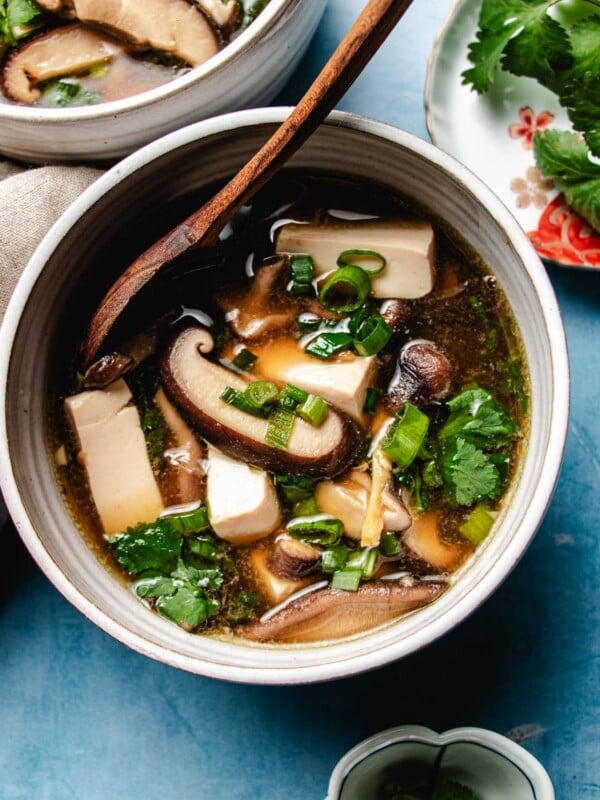
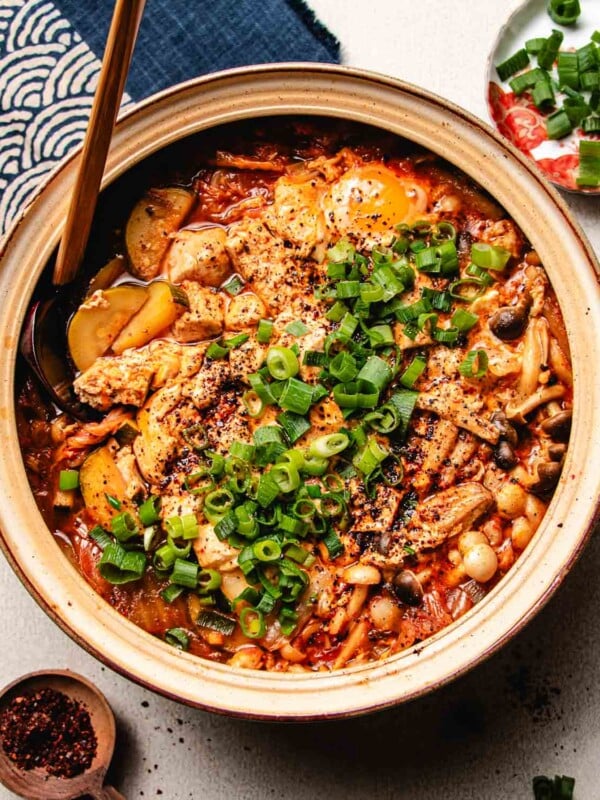
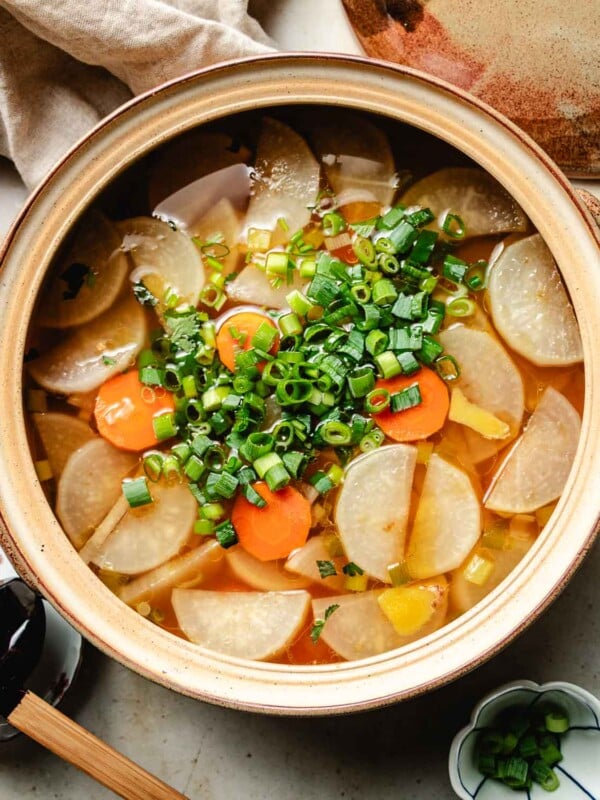
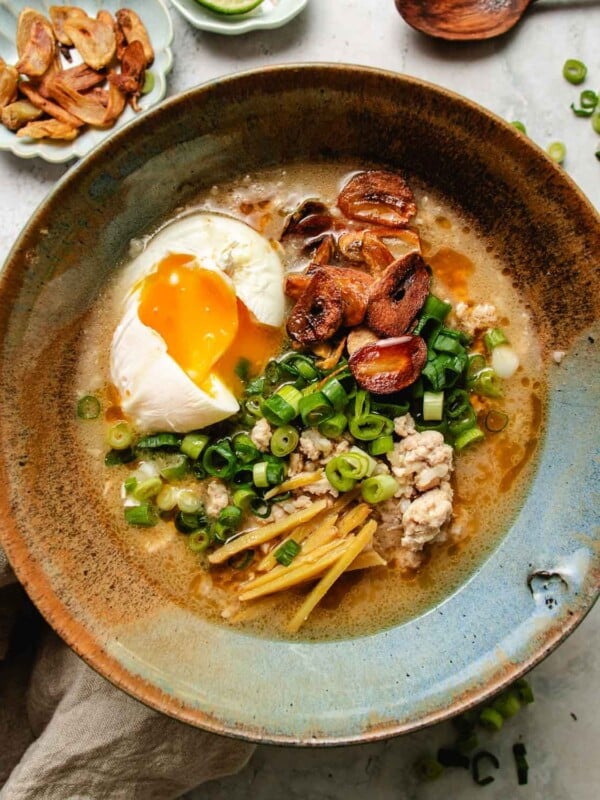
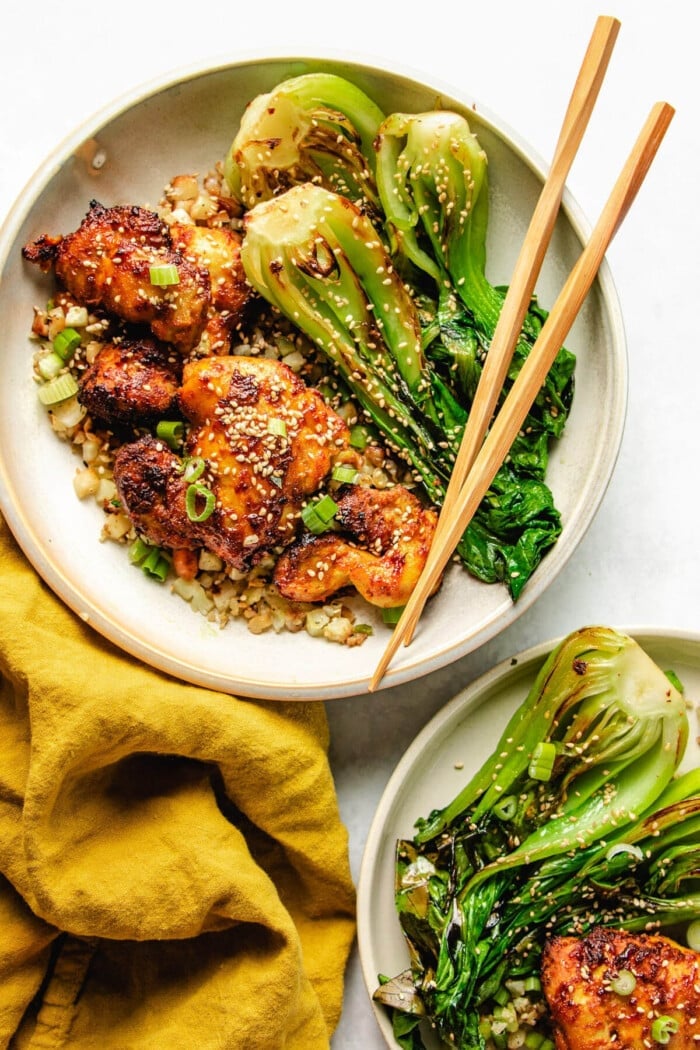








This is an awesome recipe! It’s so simple to make, yet unbelievably flavorful. Spicy, sweet, and sour all to balance out the richness of the broth. To make it fully paleo, instead of noodles I added sautéed sliced shiitake mushrooms at the end for a sort of noodle like texture and it was excellent. Next time I think I will try enoki mushrooms if I can find them!
Just a note: To make this soup, I used young rooster legs from a recent batch of rooster processing on my homestead. My rooster legs are lean and tough from free ranging so it’s essential to braise/simmer them. I simmered the roo legs for 1 hour in the soup and they turned out so well! I shredded and threw the meat back in the soup and it was amazing. I never thought I could get rooster legs to taste so good, but this did it!
Oh my goodness that sounds amazing!!! I can totally taste the flavor from here. YUM! Thank you so much for making the dish and for sharing your tips with us. Love it! XOXO 🙂
I made this today and it was the perfect comfort food for a dreary winter’s day! Used 4 tbs of red curry paste so it was pretty spicy just how I like it! If you’re a fan of curry and spicy noodles, make this. Didn’t take long at all!
The minute I began to saute the spices, I knew I had a winner. Delicious.
SO delicious! Hubby and I are gluten free and found an authentic gf khao Soi once in Thailand. Been craving it since but haven’t been able to have it until now! Tastes so delicious and authentic! And SO easy to make! Will definitely make it again 🙂
I want to make this and I have a few questions. Do you think it would work in the Instant Pot (obviously add the noodles after pressure cooking)? And do you think shirataki noodles would work? I have a lot of food allergies and those are the main noodles I use in most things.
Hello Mimi, I don’t think Instant pot will save you time for this dish. You can try cooking it on high for 15 minutes. You’d still need to saute the aromatics, the curry paste, and the coconut milk cream under the saute function first. The reason I didn’t list IP is because you can’t control the temperature once it’s sealed in the pot and the high pressure temp might make the coconut cream curdle. This bothers some people so I want to point it out. 🙂
We made it in a slow cooker over the weekend and it was super delicious – tender chicken and rich creamy broth just like we remembered in Thailand. I didn’t have all the ingredients (mainly the toppings) but that didn’t affect the taste and flavor at all. This is a much simpler version and it’s practical to make!
So happy to hear! That’s wonderful!
Yay, so excited! I’ve been stalking and hoping you’d create this recipe after your trip approximately 2 years ago 😬☺️. Thank you!!!! 😋☺️
Thank you so much! Haha yes it did take me some time to hit “publish”!